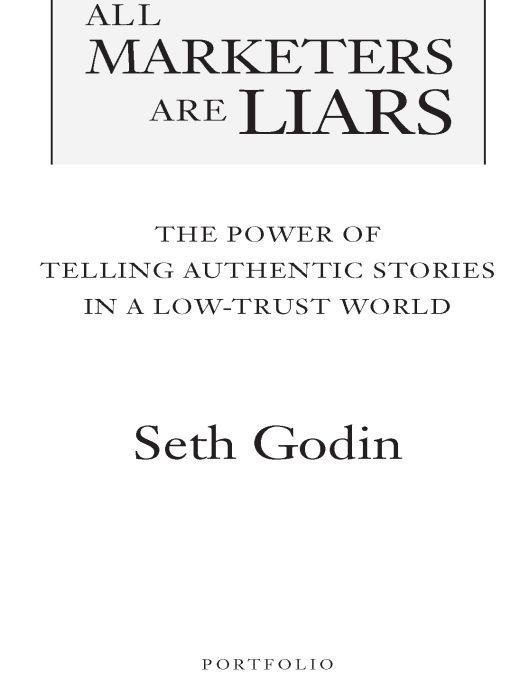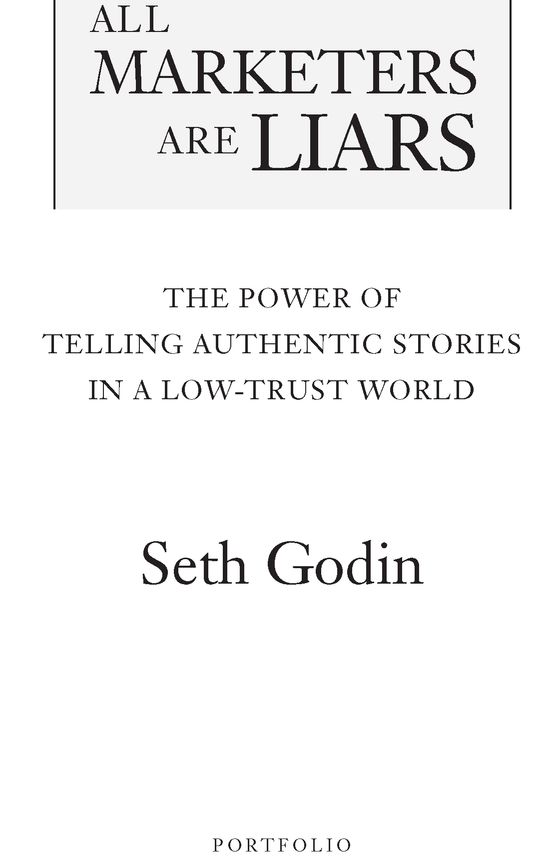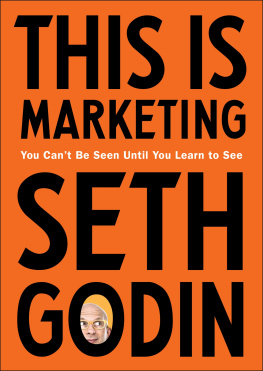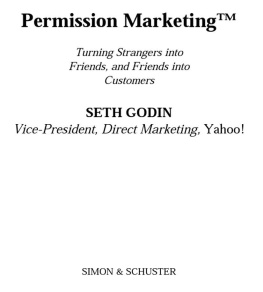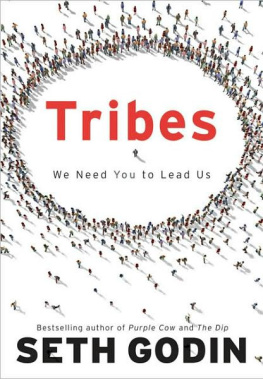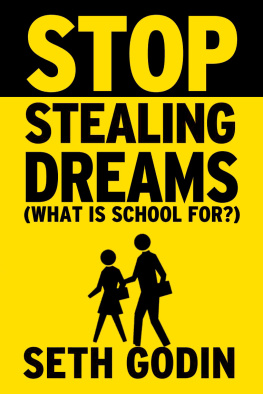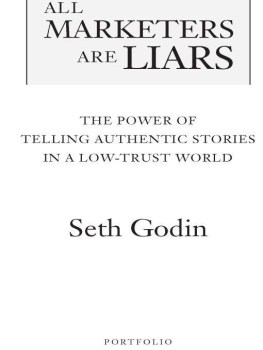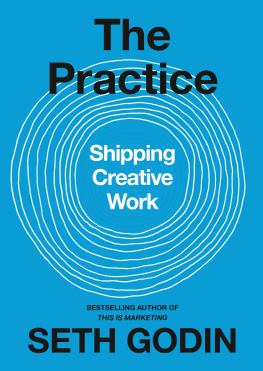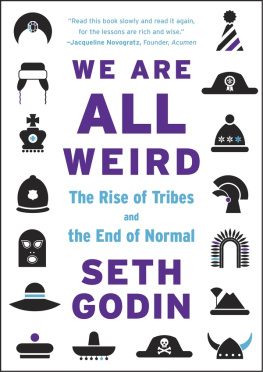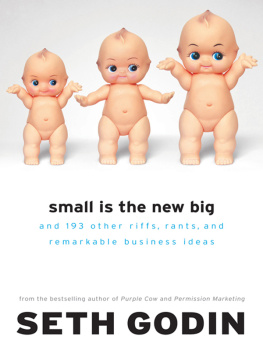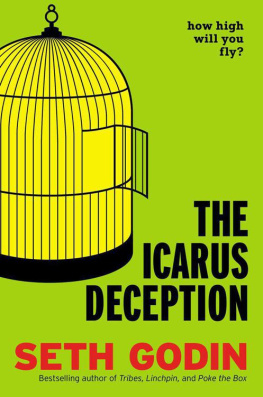Table of Contents
Dont just tell me the facts,
tell me a story instead.
Be remarkable!
Be consistent!
Be authentic!
Tell your story to people who are inclined to believe it.
Marketing is powerful. Use it wisely.
Live the lie.
PREFACE
You believe things that arent true.
Let me say that a different way: Many things that are true are true because you believe them.
The ideas in this book have elected a president, grown nonprofit causes, created billionaires, and fueled movements. Theyve also led to great jobs, fun dates, and more than a few interactions that mattered.
Ive seen this book in campaign headquarters and carried around at evangelical conferences. Ive also gotten e-mail from people who have used it in Japan and the UK and yes, Akron, Ohio. The ideas here work because they are simple tools to understand what human beings do when they encounter you and your organization.
Heres the first half of the simple summary: We believe what we want to believe, and once we believe something, it becomes a self-fulfilling truth. (Jump ahead a few paragraphs to read the critical second part of this summary)
If you think that more expensive wine is better, then it is. If you think your new boss is going to be more effective, then she will be.
If you love the way a car handles, then youre going to enjoy driving it.
That sounds so obvious, but if it is, why is it so ignored? Ignored by marketers, ignored by ordinarily rational consumers, and ignored by our leaders.
Once we move beyond the simple satisfaction of needs, we move into the complex satisfaction of wants. And wants are hard to measure and difficult to understand. Which makes marketing the fascinating exercise it is.
Heres the second part of the summary: When you are busy telling stories to people who want to hear them, youll be tempted to tell stories that just dont hold up. Lies. Deceptions.
This sort of storytelling used to work pretty well. Joe McCarthy became famous while lying about the Communist threat. Bottled water companies made billions while lying about the purity of their product compared with tap water in the developed world.
The thing is, lying doesnt pay off anymore. Thats because when you fabricate a story that just doesnt hold up to scrutiny, you get caught. Fast.
So, its tempting to put up a demagogue for vice president, but it doesnt take long for the reality to catch up with the story. Its tempting to spin a tall tale about a piece of technology or a customer service policy, but once we see it in the wild, we talk about it and you wither away.
Thats why I think this book is one of the most important Ive written. It talks about two sides of a universal truth, one that has built every successful brand, organization, and candidate, and one that we rarely have the words to describe.
Here are the questions I hope youll ask (your boss, your colleagues, your clients) after youve read this book:
Whats your story?
Will the people who need to hear this story believe it?
Is it true?
Every day, we see mammoth technology brands fail because they neglected to ask and answer these questions. We see worthy candidates gain little attention and flawed ones bite the dust. There are small businesses that are so focused on what they do that they forget to take the time to describe the story of why they do it. And on and on.
If what youre doing matters, really matters, then I hope youll take the time to tell a story. A story that resonates and a story that can become true.
The irony is that I did a lousy job of telling a story about this book. The original jacket seemed to be about lying and seemed to imply that my readers (marketers) were bad people. For people who bothered to read the book, they could see that this wasnt true, but by the time they opened the book, it was too late. A story was already told.
I had failed.
You dont get a second chance in publishing very often, and Im thrilled that my publisher let me try a new jacket, and triply thrilled that it worked. After all, youre reading this.
So, go tell a story. If it doesnt resonate, tell a different one.
When you find a story that works, live that story, make it true, authentic, and subject to scrutiny. All marketers are storytellers. Only the losers are liars.
HIGHLIGHTS
I have no intention of telling you the truth.
Instead Im going to tell you a story. This is a story about why marketers must forsake any attempt to communicate nothing but the facts, and must instead focus on what people believe and then work to tell them stories that add to their worldview.
Make no mistake. This is not about tactics or spin or little things that might matter. This is a whole new way of doing business. Its a fundamental shift in the paradigm of how ideas spread. Either youre going to tell stories that spread, or you will become irrelevant.
In the first few pages, Ill explain what the whole book is about, and then well take it apart, bit by bit, from the beginning, so you can learn how to tell stories too.
IN THE BEGINNING, THERE WAS THE STORY
Before marketing, before shopping carts and long before infomercials, people started telling themselves stories.
We noticed things. We noticed that the sun rose every morning and we invented a story about Helios and his chariot. People got sick and we made up stories about humors and bloodletting and we sent them to the barber to get well.
Stories make it easier to understand the world. Stories are the only way we know to spread an idea.
Marketers didnt invent storytelling. They just perfected it.
YOURE A LIAR
So am I.
Everyone is a liar. We tell ourselves stories because were superstitious. Stories are shortcuts we use because were too overwhelmed by data to discover all the details. The stories we tell ourselves are lies that make it far easier to live in a very complicated world. We tell stories about products, services, friends, job seekers, the New York Yankees and sometimes even the weather.
We tell ourselves stories that cant possibly be true, but believing those stories allows us to function. We know were not telling ourselves the whole truth, but it works, so we embrace it.
We tell stories to our spouses, our friends, our bosses, our employees and our customers. Most of all, we tell stories to ourselves.
Marketers are a special kind of liar. Marketers lie to consumers because consumers demand it. Marketers tell the stories, and consumers believe them. Some marketers do it well. Others are pretty bad at it. Sometimes the stories help people get more done, enjoy life more and even live longer. Other times, when the story isnt authentic, it can have significant side effects and consumers pay the price.
The reason all successful marketers tell stories is that consumers insist on it. Consumers are used to telling stories to themselves and telling stories to each other, and its just natural to buy stuff from someone whos telling us a story. People cant handle the truth.
GEORG RIEDEL IS A LIAR
Georg is a tenth-generation glassblower, an artisan pursuing an age-old craft. Im told hes a very nice guy. And hes very good at telling stories.

